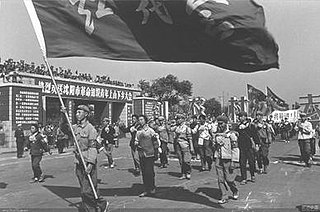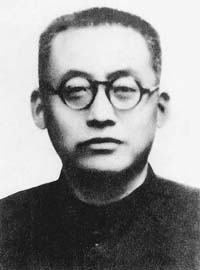The program
In 1926, after developing successful literacy campaigns across the nation, mainly in cities, James Yen and the Mass Education Movement (MEM) decided to start programs in the countryside. The village of Zhaicheng, in Ding Xian (Ding County) in central Hebei, had started a program of local self-government nearly a decade before, and was chosen because of the welcome offered by village elders. The MEM started programs of literacy education, but in spite of original success, one villager explained to Yen, "Dr. Yen, I am grateful to know how to read, but my stomach is just as empty as my illiterate neighbor's." Yen realized that literacy, in fact, no one approach, could address the village's problems. He then identified the "Four Weaknesses" of China as "poverty, ignorance, disease, and misgovernment," and invited Chinese experts to come to live in Ding Xian and design experimental program to address each one of them:
- The problem of "Ignorance" was to be addressed by village schools and cultural programs which included village drama. among others.
- The problem of Poverty was to be addressed by farmers' cooperatives, improved agricultural techniques, seeds, and new breeds of plants and animals.
- The problem of Health was addressed by a pyramidal structure in which Village Health Workers were trained to keep records, treat minor problems, give basic inoculations, and refer more serious cases to clinics in the market towns. [6]
- Politics. As the work expanded from Zhaicheng village to encompass most of Ding Country, the MEM saw greater and greater need to address political problems such as taxation, land ownership, and corruption. in 1932, the Hebei provincial government turned political control of the county over to the MEM, creating the Hebei Institute for Political and Social Reconstruction (IPSR). [7]
The work at Ding Xian attracted nationwide attention and developed many new techniques for rural development which did not depend on central government control, violent revolution, or large infusions of foreign money. The National Rural Reconstruction Movement held three national conferences involving several hundred government and private projects. James Yen and Liang Shuming were the most prominent leaders. [8]
Most of the rural reconstruction work was halted by the Japanese invasion of Hebei and North China in 1937. [9] But even though reformers left the Ding Xian Experiment, villagers in Ding Xian kept up local government, schools, public health work, and agricultural work [10] as had been intended when MEM programs were designed to be self-sustainable.

The Up to the Mountains and Down to the Countryside Movement, often known simply as the Down to the Countryside Movement, was a policy instituted in the People's Republic of China between mid-1950s and 1978. As a result of what he perceived to be pro-bourgeois thinking prevalent during the Cultural Revolution, Chairman Mao Zedong declared certain privileged urban youth would be sent to mountainous areas or farming villages to learn from the workers and farmers there. In total, approximately 17 million youth were sent to rural areas as a result of the movement. Usually only the oldest child had to go, but younger siblings could volunteer to go instead.

Liang Shuming, born Liang Huanding (梁焕鼎), courtesy name Shouming (壽銘), was a Chinese philosopher, politician, and writer in the Rural Reconstruction Movement during the late Qing dynasty and early Republican eras of Chinese history.

Dingzhou, or Tingchow in Postal Map Romanization, and formerly called Ding County or Dingxian, is a county-level city in the prefecture-level city of Baoding, Hebei Province. As of 2009, Dingzhou had a population of 1.2 million. Dingzhou has 3 subdistricts, 13 towns, 8 townships, and 1 ethnic township. Dingzhou is about halfway between Baoding and Shijiazhuang, 196 kilometers (122 mi) southwest of Beijing, and 68 kilometers (42 mi) northeast of Shijiazhuang.

Y. C. James Yen, known to his many English speaking friends as "Jimmy," was a Chinese educator and organizer known for his work in mass literacy and rural reconstruction, first in China, then in many countries.
The Rural Reconstruction Movement was started in China in the 1920s by Y.C. James Yen, Liang Shuming and others to revive the Chinese village. They strove for a middle way, independent of the Nationalist government but in competition with the radical revolutionary approach to the village espoused by Mao Zedong and the Chinese Communist Party.
Sino-American Joint Commission on Rural Reconstruction is a commission established in 1948 in mainland China. After the Chinese Civil War, the JCRR then moved to Taiwan, where its work has been widely credited with laying the agricultural basis in the 1950s and 1960s for Taiwan's outstanding economic growth in the following decades by a coordinated program of economic, social, and technical development.
The sent-down, rusticated, or "educated" youth, also known as the zhiqing, were the young people who—beginning in the 1950s until the end of the Cultural Revolution, willingly or under coercion—left the urban districts of the People's Republic of China to live and work in rural areas as part of the "Up to the Mountains and Down to the Countryside Movement".

Tao Xingzhi, was a renowned Chinese educator and reformer in the Republic of China mainland era. He studied at Teachers College, Columbia University, and returned to China to champion progressive education. His career in China as a liberal educator was not derivative of John Dewey, as some have alleged, but creative and adaptive. He returned to China at a time when the American influence was zesty and self-confident, and his very name at that time (zhixing) meant "knowledge-action," reflecting the catch-phrase of the Neo-Confucian philosopher Wang Yangming which implied that once knowledge (zhi) had been obtained, then action (xing) would be easy.

Sidney David Gamble was born in Cincinnati, Ohio, to David Berry and Mary Huggins Gamble; grandson of James Gamble, who, with William Procter, founded Procter & Gamble in 1837. in 1912 he graduated magna cum laude from Princeton University with a Bachelor of Literature degree and was elected to Phi Beta Kappa. He visited China for four extended periods, 1908, 1917–1919, 1924–27, and 1931–1932, doing Christian social work for YMCA and conducting social surveys. He is now best known for his remarkable and extensive photographs of Peking and North China. He also took numerous photographs of West China.
New Rural Reconstruction is an intellectual current and social movement initiated by Wen Tiejun and other activists to address the crisis they saw in the Chinese countryside at the start of the 21st century. In 2009, at its core there were several NGOs and academic institutions, dozens of rural cooperatives and associations, and hundreds of participants. More broadly, the ideas and spirit of NRR have influenced a growing movement of rural experimentation, including many activists who do not use the term "NRR".
The civil rights movement (1865-1896) aimed to eliminate racial discrimination against African Americans, improve their educational and employment opportunities, and establish their electoral power, just after the abolition of slavery in the United States. The period from 1865 to 1895 saw a tremendous change in the fortunes of the Black community following the elimination of slavery in the South.
The Philippine Rural Reconstruction Movement, abbreviated as PRRM, is a non-governmental organization and institution formed in 1952 to assist peasants in the Philippines. As a movement, it was initiated by upper and middle class group of individuals based on the experiences gained from the rural reconstruction and development done in China during the beginning of the 1900s. After World War II, among its tasks had been the establishment of cooperatives in rural communities. It was the inspiration for the founding of the Federation of Free Farmers in 1953, as well as the birthing of organizations similar to PRRM in other countries such as Thailand, Colombia, India, and Guatemala. Its main office is in Quezon City, which became possible through Dr. Yen's establishment of another related organization during the 1960s, namely the International Institute of Rural Reconstruction (IIRR).
International Institute of Rural Reconstruction, also known as IIRR is a non-profit organization that helps empower rural communities by making them self-sufficient. By offering programs across health, education, environment, and livelihood, its goal is to have rural communities take charge of their own success. The organization has delivered programs to more than 40 countries in Asia, Africa, and Latin America and directly impacted the lives of over 19 million people as of 2019.
Street Library Ghana (SLG) is a volunteer-driven, social enterprise based in Ghana that aims to improve the life chances of children and youth in vulnerable communities by addressing literacy and education issues.

David Z.T. Yui was a Chinese Protestant Christian leader who led the Chinese National YMCA. in the 1920s and 1930s.

The Call is a novel published in 1985 by the American writer John Hersey. The novel, which is in the form of a fictionalized biography with letters and excerpts from Treadup's journal, presents the experience of David Treadup, an American Protestant missionary in China during the first half of the twentieth century. As the novel progresses, and China undergoes Japanese invasion and communist revolution, Treadup reconsiders whether his efforts to help China were useful and questions the usefulness of the Christian mission. Hersey based Treadup on a composite of six historical China missionaries, including his own father. Other historical figures appear, sometimes under their own names.

The Land Reform Movement, also known by the Chinese abbreviation Tǔgǎi (土改), was a mass movement led by the Chinese Communist Party (CCP) leader Mao Zedong during the late phase of the Chinese Civil War after the Second Sino-Japanese War ended in 1945 and in the early People's Republic of China, which achieved land redistribution to the peasantry. Landlords – whose status was theoretically defined through the percentage of income derived from exploitation as opposed to labor – had their land confiscated and they were subjected to mass killing by the CCP and former tenants, with the estimated death toll ranging from hundreds of thousands to millions. The campaign resulted in hundreds of millions of peasants receiving a plot of land for the first time.
Guy Salvatore Alitto is an American academic in the History and East Asian Languages and Civilization Departments at the University of Chicago. He is known in China for revitalizing the scholarship on Chinese Confucian scholar Liang Shuming. He is also often quoted in popular Chinese media sources. He is best known in America for his scholarship and for his role as translator for the first official Chinese delegations to the United States after Richard Nixon's first visits to China.

Nora Tze Hsiung Chu (1902–1977) was a Chinese educator. As secretary general of the National Association for Refugee Children in the 1940s, she oversaw dozens of orphanages and programs for child refugees in China.

Chinese National Association of the Mass Education Movement, was founded in 1923 with the aim of using popular, accessible education as a means of societal reform, by Tao Xingzhi, Zhu Qihui, and Y. C. James Yen and educational representatives from various provinces. Initially based in Beijing, branches were successively established in more than 20 provinces and regions across the country, where they opened schools for the common people in rural areas. Zhu Qihui served as the chairwoman, Tao Xingzhi was the secretary of the board of directors, and Yan Yangchu was the general secretary.











